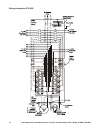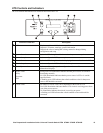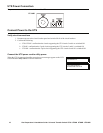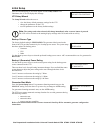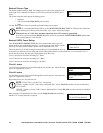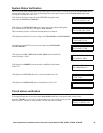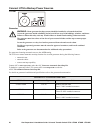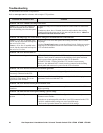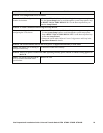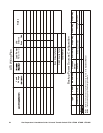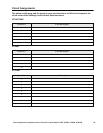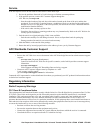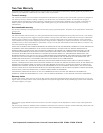
Site Preparation & Installation Guide Universal Transfer Switch UTS6 UTS6H UTS6BI UTS10BI22
Troubleshooting
Use this chart to solve minor UTS problems.
Refer to www.apc.com for assistance with complex UTS problems.
Problem and Possible Cause Solution
Problem: The UTS conduit is too long or too short
Cause: The UTS was not installed at
the recommended one foot distance
from the building circuit breaker panel.
Conduit too long: have a licensed electrician cut the conduit to shorten the
length.
Conduit too short: have a licensed electrician add conduit to the existing
conduit utilizing the proper use of wire nuts and junction boxes. Adhere to
all national and local electrical codes.
Problem: The amperage of a circuit must be changed to accommodate the connected load
Cause: A 15 A fuse is installed in the
circuit, but the connected load requires
the use of a 20 A fuse.
Cause: A 20 A fuse is installed in the
circuit, but the connected load requires
the use of a 15 A fuse.
Remove the UTS cover and replace the existing fuse with a fuse of correct
amperage.
Use the Circuit Setup button to reset the affected circuit. Failure to reset the
amperage for the affected circuit will cause nuisance circuit tripping, or a
UTS overload condition.
Problem: The UTS does not turn on
Cause: Incorrect wiring to circuits. UTS6/UTS6H - Utilizing all of the UTS circuits is not necessary. However,
Circuits 5 and 6 must be connected to the building circuit panel and must
receive power from opposite phases for the UTS to function.
UTS6BI/UTS10BI - Utilizing all of the UTS circuits is not necessary.
However, the dedicated 240 V circuits must be connected to the building
circuit panel and must receive power for the UTS to function.
Problem: The UTS does not receive power from the generator
Cause: The generator has been
incorrectly connected to the UTS.
Check to be sure the correct wiring configuration has been used.
Cause: The generator output is not
120/240 V single phase. This is not
applicable to the UTSS6H.
Check the specifications of the generator. Only 120 V/240 V single phase
generators can be used with the UTS.
Problem: The UTS does not receive power from the UPS
Cause: The UPS is overloaded and has
shutdown.
Disconnect the circuits set as uninterruptible one at a time until the UPS
begins operating.
Problem: The load does not receive power during a power outage
Cause: A UTS configuration error is
present.
Check the UTS system and circuit configurations and correct any errors.
Common errors include:
• circuits set as uninterruptible when there is no UPS connected to the UTS.
• ALM is enabled and the settings are out of specified range.
Refer to the Operation Manual for details on ALM settings.



